

Workspace Login. Saudi palace intrigue sparks speculation. Saudi Arabia's Deputy Crown Prince Mohammed bin Nayef (L) arrives with his uncle King Salman (R) to greet US President Barack Obama at King Khalid International Airport in Riyadh, Jan. 27, 2015.
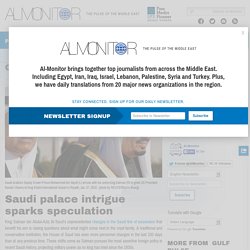
(photo by REUTERS/Jim Bourg) Author: Bruce Riedel Posted May 1, 2015 King Salman bin Abdul-Aziz Al Saud's unprecedented changes in the Saudi line of succession that benefit his son is raising questions about what might come next in the royal family. A traditional and conservative institution, the House of Saud has seen more personnel changes in the last 100 days than at any previous time. These shifts come as Salman pursues the most assertive foreign policy in recent Saudi history, projecting military power as no king has tried since the 1930s. Summary⎙ Print Saudi King Salman's unprecedented personnel changes and other moves have many wondering what might come next from the House of Saud. What happened with Muqrin is a key question. Speculation surrounding Muqrin's departure will be intense.
Workspace Login. Pourquoi sommes-nous sunnites ? LE MONDE | • Mis à jour le | Par Alain Frachon Récemment, à la conférence de rédaction, un chef de service a posé cette question : mais pourquoi sommes-nous avec les sunnites ?
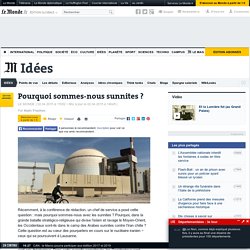
Workspace Login. Islamisme radical. The Pulse of the Middle East. Après les attentats, comprendre, approfondir et débattre. Le Monde.fr | • Mis à jour le | Par Gilles van Kote Gilles van Kote, directeur du Monde « Les attaques terroristes de ces dernières semaines en région parisienne ont marqué la France et, plus largement, la communauté internationale : du traumatisme généré par ces actes d'une violence inédite jusqu'à la réponse donnée par des millions de personnes dans les rues, leurs effets se font sentir dans des domaines aussi divers que l'éducation, la sécurité, la politique ou la diplomatie.
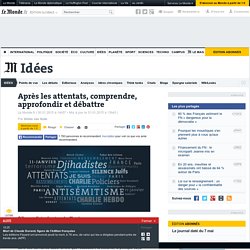
Plus que jamais, Le Monde a la volonté de répondre aux attentes de ses lectrices et lecteurs, et notamment au besoin d'analyses qui permettent de comprendre les mécanismes à l'œuvre dans ces événements dramatiques et d'appréhender leurs conséquences, forcément durables, sur nos sociétés. Voici une sélection de ces textes publiés depuis le 7 janvier. Nous continuerons, dans les jours et semaines qui viennent, à ouvrir nos colonnes pour que vive un débat d'idées forcément nécessaire. » Zeev Sternhell est historien. Workspace Login. 2014 Guerre à gaza. Ahmed Chah Massoud. 2014 Mossoul aux mains de l'EI - persécutions. Why is Jabhat al-Nusra no longer useful to Turkey? Islamist Syrian rebel group Jabhat al-Nusra members gesture while posing on a tank in Idlib province, May 17, 2014.
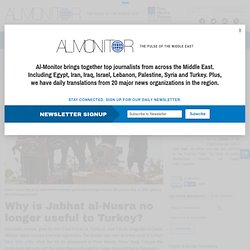
(photo by REUTERS/Hamid Khatib) Author: Semih Idiz Posted June 10, 2014 Reluctantly perhaps, given the time it took it to do so, Turkey on June 3 finally designated al-Qaeda-affiliated Jabhat al-Nusra a terrorist organization. The decision was seen as further proof of Turkey’s failed Syria policy, which has left the government of Prime Minister Recep Tayyip Erdogan little choice but to fall in line with the United States with regard to radical groups fighting in that country. Summary⎙ Print The Turkish government may be waking up to its failed Syria policies. Turkey ignored direct warnings of ISIS attack on Mosul.
Fighters of the Islamic State of Iraq and al-Sham (ISIS) stand guard at a checkpoint in the northern Iraq city of Mosul, June 11, 2014.
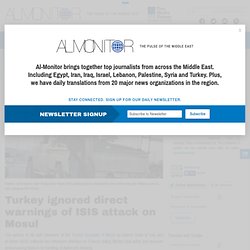
(photo by REUTERS) Author: Amberin Zaman Posted June 12, 2014 The seizure of 49 staff members of the Turkish consulate in Mosul by Islamic State of Iraq and al-Sham (ISIS) militants has refocused attention on Turkey’s failing Middle East policy and exposed embarrassing flaws in its handling of diplomatic security. Summary⎙ Print Turkish Prime Minister Recep Tayyip Erdogan faces another political crisis over the hostage crisis and his Syria and Iraq policies. As Turkish leaders scramble to find a way out of the crisis, details of the security lapses that led to the storming of the consulate are beginning to emerge. What we know On June 6, the governor of Mosul, Atheel al-Nujaifi, put in an emergency call to Kareem Sinjari, the interior minister of the Kurdistan Regional Government (KRG) in northern Iraq saying that ISIS was about to take over the city.
Liberman: Arabs 'must come out of the closet' US Secretary of State John Kerry (R) meets Israeli Foreign Minister Avigdor Liberman in Rome, March 6, 2014.
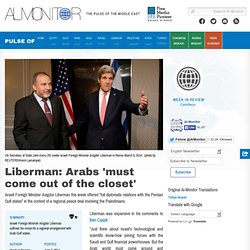
(photo by REUTERS/Kevin Lamarque) Author: Week in Review Posted June 7, 2014 Israeli Foreign Minister Avigdor Liberman this week offered “full diplomatic relations with the Persian Gulf states” in the context of a regional peace deal involving the Palestinians. Summary⎙ Print Israeli Foreign Minister Avigdor Liberman outlines his vision for a regional arrangement with Arab Gulf states. Could Moldova's Gagauzia repeat Crimea scenario? Proche/Moyen-Orient-Turquie. Turkey’s Africa policies blend hard, soft power. Turkish navy officers attend a delivery ceremony for the first nationally designed combat ship TCG Heybeliada at the Tuzla Naval shipyard in Istanbul, Sept. 27, 2011.
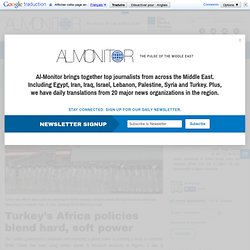
The war on Twitter, the blowback from Ukraine. Turkey's limitations in the Black Sea and Crimea. US Navy guided-missile destroyer USS Truxtun sets sail in the Bosporus, on its way to the Black Sea, March 7, 2014.
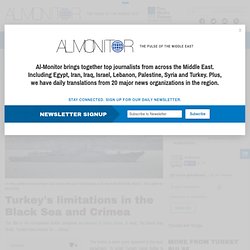
(photo by REUTERS) Author: Cengiz Çandar Posted March 19, 2014 The title of the EurasiaNet article contained an element of black humor. The fading Turkish model for the Arab world. A statue of modern Turkey's founder Ataturk and a mosque in the background are pictured in a square where Turkish Prime Minister Recep Tayyip Erdogan is to attend an election rally of his ruling Justice and Development Party (AKP) in Kirikkale, March 4, 2014.
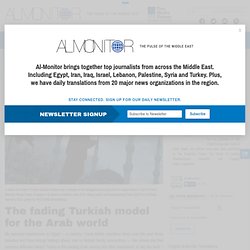
(photo by REUTERS/Umit Bektas) Author: Semih Idiz Posted March 14, 2014 My personal experiences in Egypt — a country I have visited countless times over the past three decades and have strong feelings about, due to historic family connections — has shown me that common attitudes toward Turkey in this leading Arab country are often ambivalent, to say the least. I have found from my experiences in other Middle Eastern countries that the general Arab attitude toward Turkey is a strange brew of derision and admiration. Summary⎙ Print Allegations of corruption against the government of Turkish Prime Minister Recep Tayyip Erdogan is undermining what little support may still remain across the Middle East.
US stays out of Turkish politics. Turkish Prime Minister Recep Tayyip Erdogan attends a meeting with (from L) Ross Wilson, Chuck Hagel, John Kerry and Joe Biden in Ankara, Feb. 22, 2008.
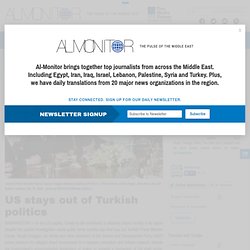
(photo by REUTERS/Burhan Ozbilici) Author: Tulin Daloglu Posted March 11, 2014 WASHINGTON — In the US capital, Turkey is still considered a relatively stable country in its region despite the judicial investigation made public three months ago that has put Turkish Prime Minister Recep Tayyip Erdogan, his family and other members of the Justice and Development Party (AKP) under pressure for alleged direct involvement in a massive corruption and bribery network; despite the government’s unprecedented application of power to prevent a deepening of the graft probe, and despite the endless stream of leaked audio tapes allegedly exposing the government’s murky deals in action. « Ce n’est pas une menace, c’est en fait une déclaration de guerre à l’Ukraine » Qui aura le dernier mot en Ukraine ?
Qui aura le dernier mot en Ukraine ? Workspace Webmail. Sera Sykes-Picot survivre tumulte Moyen-Orient? - Al-Monitor: le pouls du Moyen-Orient. A map of the Sykes–Picot agreement, which was signed by Mark Sykes and François Georges-Picot on May 8, 1916. (photo by The National Archives/Wikimedia Commons) Author: Al-Nahar (Lebanon) Posted December 20, 2013 In 2013, the Sykes-Picot agreement is struggling for survival. Nearly 100 years have turned that arrangement into small entities (Lebanon, Jordan and Palestine), large ones (Iraq and Syria), as well as several nationalities, militaries and political cultures. Summary⎙ Print The Arabs have long maligned the Sykes-Picot agreement but now that it may be collapsing, they have started seeing its positives. Hollande visit lost in Turkey’s political muddle. French President Francois Hollande hands his overcoat to a bodyguard as he arrives with Turkish President Abdullah Gul to attend a state dinner in Ankara, Jan. 27, 2014.
(photo by REUTERS/Alain Jocard/Pool) Author: Cengiz Çandar Posted January 31, 2014 Developments are moving so fast in Turkey that an issue that might occupy the agenda elsewhere for weeks lasts no more than a day. This was the case with French President Francois Hollande’s two-day visit to Ankara and Istanbul. Summary⎙ Print Turkey’s foreign policy is not multifaceted but multiproblematic. Chine.